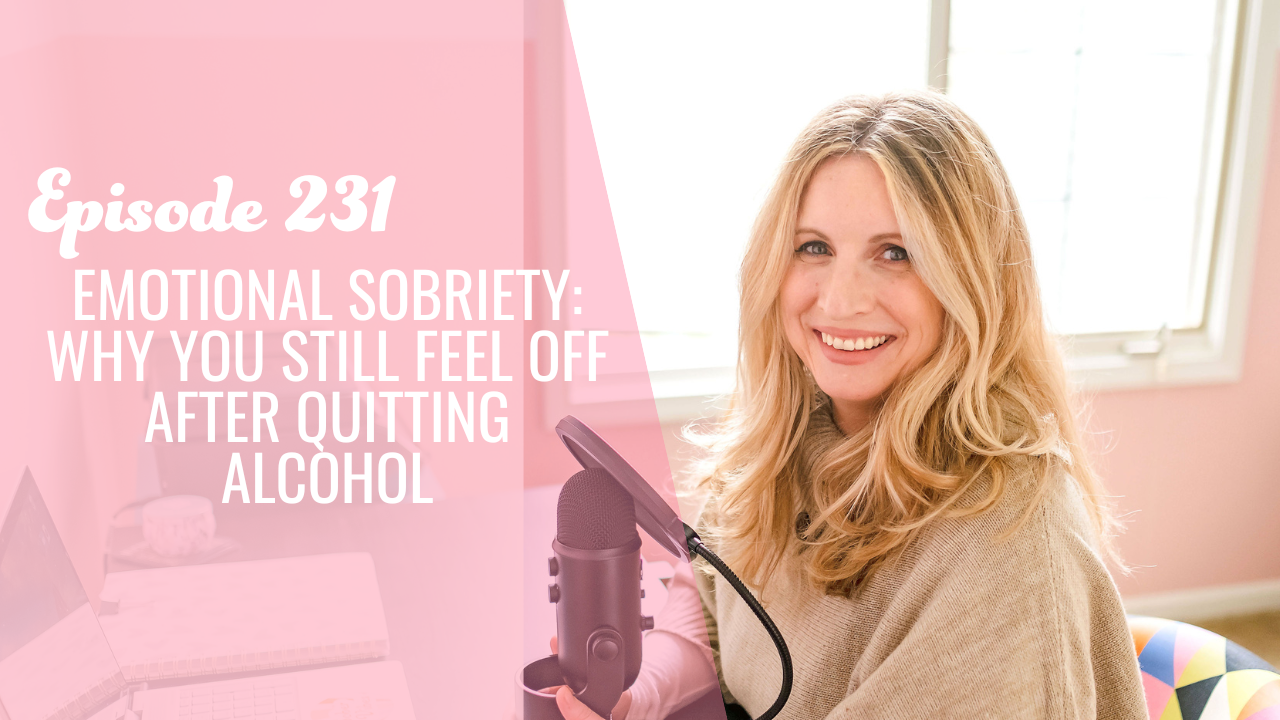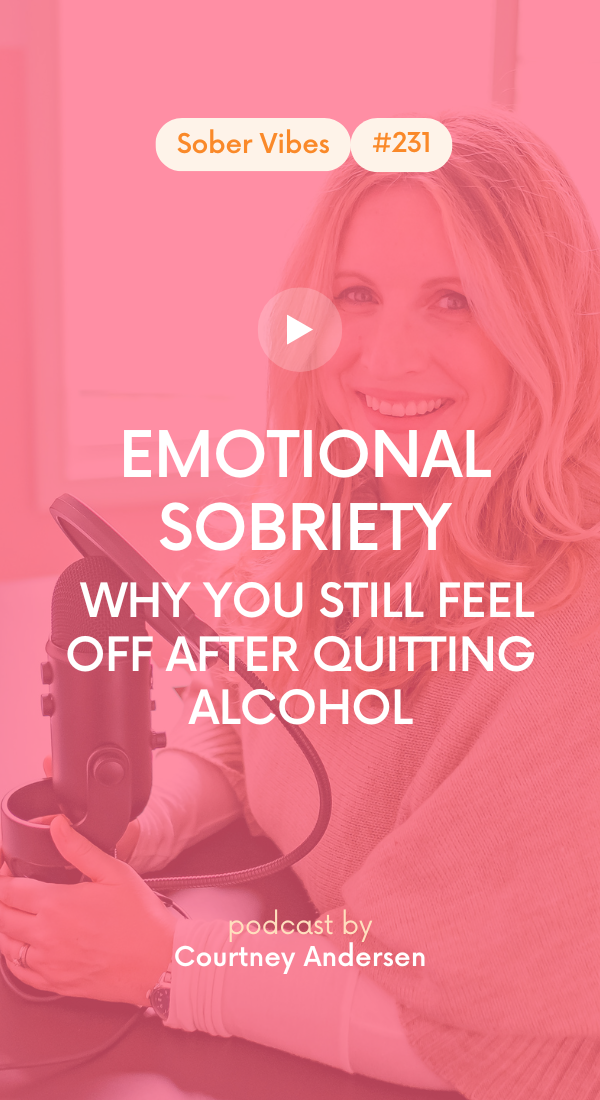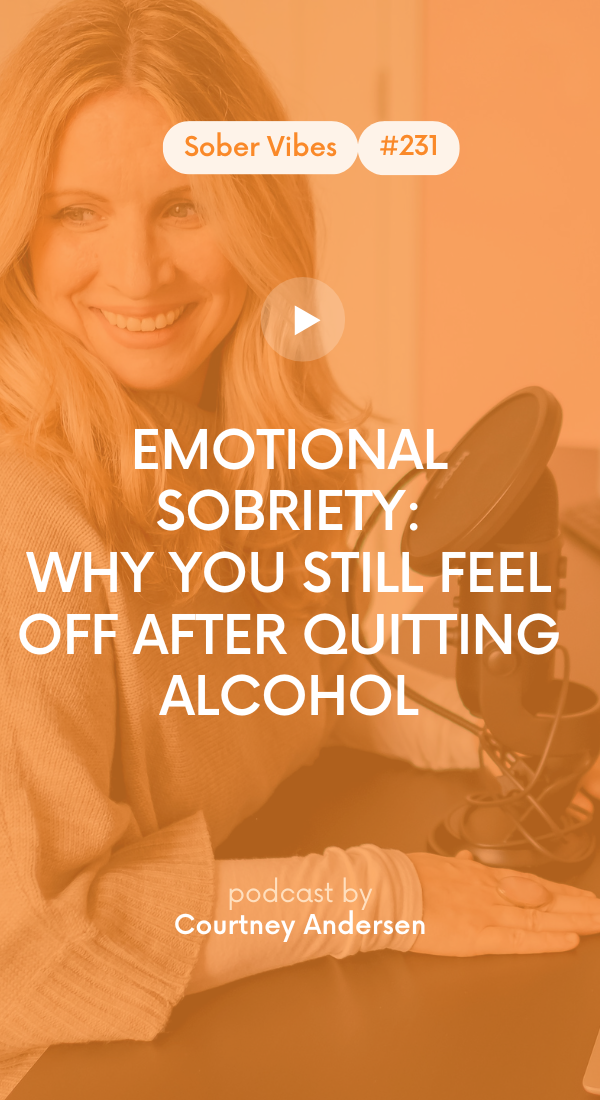Emotional Sobriety: Why You Still Feel Off After Quitting Alcohol
Aug 26, 2025
Episode 231 Emotional Sobriety: Why You Still Feel Off After Quitting Alcohol
Spotify | Apple Podcast | Website
“Emotional work changes your sobriety from survival to stability.”

Here’s a glance at this episode...
In this episode, Courtney dives into the heart of emotional sobriety that confusing stage where, even months or years after quitting drinking, you still feel anxious, reactive, or emotionally unstable. She normalizes the experience, shares her own turning points, and lays out why it’s not a sign you’re “doing sobriety wrong.” Instead, it’s the next layer of healing. From therapy and nervous system regulation to boundaries, self-worth, and breaking old loops, Courtney highlights the tools that help move you from white-knuckling survival into long-term stability and peace.
What you will learn in this episode:
- What emotional sobriety is and why it matters
- Why anxiety, reactivity, and shame often rise years into sobriety
- How to spot emotional dysregulation and self-sabotage patterns
- Tools for regulating your nervous system without numbing
- The importance of boundaries, therapy, and rebuilding self-worth
- Why this stage is universal and not a sign you’re failing
Why Emotional Sobriety Feels So Hard (And Why You’re Not Doing It Wrong)
Quitting drinking is a massive accomplishment. You’ve fought through cravings, you’ve said no when it was easier to say yes, and you’ve done what so many people think they can’t. But then it hits you. You’re sober, yet you still feel anxious, reactive, emotionally flat, or just overwhelmed.
If you’ve ever thought, “I quit drinking, so why do I still feel like a mess?”… this episode and blog post are for you. What you are experiencing is not failure, it’s the next stage of growth called emotional sobriety. And while it can feel confusing or frustrating, it’s actually a universal part of recovery.
What Emotional Sobriety Really Means
Emotional sobriety is learning how to live with your feelings without numbing, running, or spiraling. It is not about being perfect. It is about expanding your capacity to handle life’s emotions without defaulting back to old patterns.
There is a big difference between physical sobriety (not drinking) and emotional stability (feeling safe in your own skin). Physical sobriety is the first step, but emotional sobriety is what makes recovery sustainable.
And here’s the thing. Emotional sobriety often doesn’t surface right away. The first six months to a year are mostly about survival, just getting through the day without drinking. For many people, the deeper emotional work doesn’t show up until after the one-year mark, sometimes years later. That is completely normal.
The Emotional Rollercoaster After Quitting Alcohol
One of the most common surprises after quitting alcohol is just how much you start to feel. The anxiety, the overstimulation, the shame… it all bubbles up once you are no longer numbing yourself.
Courtney shares her own story here. In her third year of sobriety, she was suddenly hit with overwhelming anxiety. It came out of nowhere, to the point where she felt claustrophobic in cars and started having panic attacks. She thought, “What is happening? I quit drinking, why am I like this?” That is when she found therapy, specifically cognitive behavioral therapy (CBT), which helped her understand her anxiety and learn how to cope.
The truth is, emotions feel stronger in sobriety because years of suppression are now surfacing. You are not broken, you are simply feeling what you spent years avoiding.
Signs You’re Struggling with Emotional Sobriety
So how do you know if this is what you are going through? Some signs include:
- Snapping over small things
- Overthinking and looping in your head
- Doom scrolling or numbing out with screens instead of drinks
- Withdrawing and isolating
- Feeling emotionally flat one day and flooded the next
- Carrying shame even when you are “doing everything right”
- Reacting in ways that feel eerily similar to how you acted while drinking, just without the alcohol
This is sometimes called “dry drunk” behavior, and it can feel discouraging. But the good news is it’s also a sign that you’re ready to move into deeper healing.
Tools That Make the Difference
Here’s where things start to shift. You can’t just rely on discipline or mindset hacks, you need tools.
Start with nervous system regulation. That might look like meditation, breathwork, journaling, or simply going for a walk when you feel overwhelmed. Movement, especially consistent exercise, can help you settle into your body and release some of that built-up energy.
Boundaries are also a cornerstone of emotional sobriety. This includes boundaries with others (like limiting time with toxic people or choosing not to attend events where alcohol is the main event) and boundaries with yourself (like saying no when you’re overbooked, or choosing not to doom scroll first thing in the morning).
Therapy, coaching, and deeper personal development work also make a huge difference. Courtney talks about shifting from endless “quit lit” into books and resources that build self-esteem and address codependency or people pleasing. Sobriety gets stronger when you start to rebuild self-worth, not just avoid alcohol.
Breaking Self-Sabotage Loops
Here’s the hard truth. Many of the emotional patterns you fall into in sobriety mirror the ones from your drinking days. The self-sabotage doesn’t disappear just because you put the drink down.
This is where the real work comes in. You have to start identifying beliefs and conditioning that no longer serve you. Maybe you grew up with a parent who taught you to put everyone else first. Maybe you picked up the belief that you weren’t good enough and kept trying to prove your worth through achievement. These old scripts will keep you stuck unless you intentionally replace them with practices that bring calm, clarity, and confidence.
Breaking these loops is not easy, but it is absolutely possible. And once you start, you will notice a huge difference in how grounded you feel.
Moving from Survival to Stability
The process of emotional sobriety is not quick. It takes months, sometimes years, and that is okay. This isn’t about fixing yourself overnight, it’s about building new patterns that last.
Practical examples of small shifts include:
- Spending less time doom scrolling
- Saying no to obligations you don’t want to do
- Waking up earlier to start your day with intention
- Choosing peace over overstimulation
- Practicing honesty with yourself and with others
These little choices add up. Over time, they take you from simply surviving without alcohol to actually feeling stable and trusting yourself emotionally. The long-term payoff is peace, clarity, and a sober life that genuinely feels good.
Conclusion
If you’ve been feeling like sobriety is harder than you expected because of the emotional side of things, please know this: you are not failing, you are healing.
Emotional sobriety is not optional, it’s part of the journey. Everyone who removes alcohol eventually has to face their feelings and learn how to live with them. The good news is, once you walk through this process, your recovery deepens and your life expands in ways you could never imagine.
Stay committed, keep building your toolbox, and give yourself grace. You are doing it right, even when it feels hard.
Keep on trucking and kicking ass out there.

Thank you for listening!
If this episode has helped you, please consider rating and reviewing the podcast. (Five Stars is awesome!)
This helps me continue to make episodes for you.
★★★★★
Please Rate, Review and Subscribe to the Sober Vibes Podcast.
Podcast Sponsor-
Get $ 50 off your Soberlink device today!
Resources Mentioned:
The After — A No-BS Guide to Emotional Sobriety
*Short video coaching lessons
*Deep-dive journal workbook
*Emotional regulation + nervous system tools
Grab it now for $15 OFF with code AFTER
🖤 → THE AFTER
I want you to feel sober NOT boring!
Kickstart your sobriety with my free 2-day video workshop series to master your sober mindset and have FUN in your sobriety journey!








